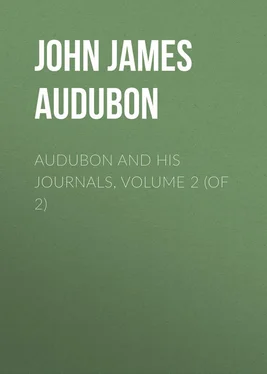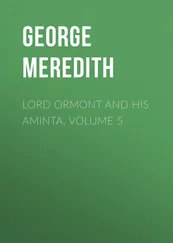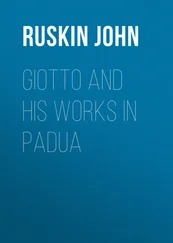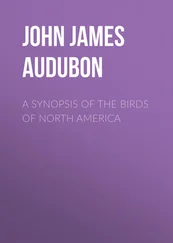John Audubon - Audubon and his Journals, Volume 2 (of 2)
Здесь есть возможность читать онлайн «John Audubon - Audubon and his Journals, Volume 2 (of 2)» — ознакомительный отрывок электронной книги совершенно бесплатно, а после прочтения отрывка купить полную версию. В некоторых случаях можно слушать аудио, скачать через торрент в формате fb2 и присутствует краткое содержание. Жанр: foreign_antique, foreign_prose, на английском языке. Описание произведения, (предисловие) а так же отзывы посетителей доступны на портале библиотеки ЛибКат.
- Название:Audubon and his Journals, Volume 2 (of 2)
- Автор:
- Жанр:
- Год:неизвестен
- ISBN:нет данных
- Рейтинг книги:5 / 5. Голосов: 1
-
Избранное:Добавить в избранное
- Отзывы:
-
Ваша оценка:
- 100
- 1
- 2
- 3
- 4
- 5
Audubon and his Journals, Volume 2 (of 2): краткое содержание, описание и аннотация
Предлагаем к чтению аннотацию, описание, краткое содержание или предисловие (зависит от того, что написал сам автор книги «Audubon and his Journals, Volume 2 (of 2)»). Если вы не нашли необходимую информацию о книге — напишите в комментариях, мы постараемся отыскать её.
Audubon and his Journals, Volume 2 (of 2) — читать онлайн ознакомительный отрывок
Ниже представлен текст книги, разбитый по страницам. Система сохранения места последней прочитанной страницы, позволяет с удобством читать онлайн бесплатно книгу «Audubon and his Journals, Volume 2 (of 2)», без необходимости каждый раз заново искать на чём Вы остановились. Поставьте закладку, и сможете в любой момент перейти на страницу, на которой закончили чтение.
Интервал:
Закладка:
July 9, Sunday. I drew at a Wolf's head, and Sprague worked at a view of the fort for Mr. Culbertson. I also worked on Mr. Culbertson's portrait about an hour. I then worked at the Porcupine, which is an animal such as I never saw or Bell either. Its measurements are: from nose to anterior canthus of the eye, 15⁄8 in., posterior ditto, 21⁄8; conch of ear, 31⁄2; distances from eyes posteriorly, 21⁄4; fore feet stretched beyond nose, 31⁄2; length of head around, 41⁄8; nose to root of tail, 181⁄2; length of tail vertebræ, 63⁄8; to end of hair, 73⁄4; hind claws when stretched equal to end of tail; greatest breadth of palm, 11⁄4; of sole, 13⁄8; outward width of tail at base, 35⁄8; depth of ditto, 31⁄8; length of palm, 11⁄2; ditto of sole, 17⁄8; height at shoulder, 11; at rump, 101⁄4; longest hair on the back, 87⁄8; breadth between ears, 21⁄4; from nostril to split of upper lip, 3⁄4; upper incisors, 5⁄8; lower ditto, 3⁄4; tongue quite smooth; weight 11 lbs. The habits of this animal are somewhat different from those of the Canadian Porcupine. The one of this country often goes in crevices or holes, and young McKenzie caught one in a Wolf's den, along with the old Wolf and seven young; they climb trees, however.
Provost tells me that Wolves are oftentimes destroyed by wild horses, which he has seen run at the Wolves head down, and when at a proper distance take them by the middle of the back with their teeth, and throw them several feet in the air, after which they stamp upon their bodies with the fore feet until quite dead. I have a bad blister on the heel of my right foot, and cannot walk without considerable pain.
July 10, Monday. Squires, Owen, McKenzie, and Provost, with a mule, a cart, and Peter the horse, went off at seven this morning for Antelopes. Bell did not feel well enough to go with them, and was unable to eat his usual meal, but I made him some good gruel, and he is better now. This afternoon Harris went off on horseback after Rabbits, and he will, I hope, have success. The day has been fine, and cool compared with others. I took a walk, and made a drawing of the beautiful sugar-loaf cactus; it does not open its blossoms until after the middle of the day, and closes immediately on being placed in the shade.
July 11, Tuesday. Harris returned about ten o'clock last night, but saw no Hares; how we are to procure any is more than I can tell. Mr. Culbertson says that it was dangerous for Harris to go so far as he did alone up the country, and he must not try it again. The hunters returned this afternoon, but brought only one buck, which is, however, beautiful, and the horns in velvet so remarkable that I can hardly wait for daylight to begin drawing it. I have taken all the measurements of this perfect animal; it was shot by old Provost. Mr. Culbertson – whose portrait is nearly finished – his wife, and I took a ride to look at some grass for hay, and found it beautiful and plentiful. We saw two Wolves, a common one and a prairie one. Bell is better. Sprague has drawn another cactus; Provost and I have now skinned the buck, and it hangs in the ice-house; the head, however, is untouched.
July 12, Wednesday. I rose before three, and began at once to draw the buck's head. Bell assisted me to place it in the position I wanted, and as he felt somewhat better, while I drew, he finished the skin of the Porcupine; so that is saved. Sprague continued his painting of the fort. Just after dinner a Wolf was seen leisurely walking within one hundred yards of the fort. Bell took the repeating rifle, went on the ramparts, fired, and missed it. Mr. Culbertson sent word to young Owen McKenzie to get a horse and give it chase. All was ready in a few minutes, and off went the young fellow after the beast. I left my drawing long enough to see the pursuit, and was surprised to see that the Wolf did not start off on a gallop till his pursuer was within one hundred yards or so of him, and who then gained rapidly. Suddenly the old sinner turned, and the horse went past him some little distance. As soon as he could be turned about McKenzie closed upon him, his gun flashed twice; but now he was almost à bon touchant , the gun went off – the Wolf was dead. I walked out to meet Owen with the beast; it was very poor, very old, and good for nothing as a specimen. Harris, who had shot at one last night in the late twilight, had killed it, but was not aware of it till I found the villain this morning. It had evidently been dragged at by its brothers, who, however, had not torn it. Provost went over to the other fort to find out where the Buffaloes are most abundant, and did not return till late, so did no hunting. A young dog of this country's breed ate up all the berries collected by Mrs. Culbertson, and her lord had it killed for our supper this evening. The poor thing was stuck with a knife in the throat, after which it was placed over a hot fire outside of the fort, singed, and the hair scraped off, as I myself have treated Raccoons and Opossums. Then the animal was boiled, and I intend to taste one mouthful of it, for I cannot say that just now I should relish an entire meal from such peculiar fare. There are men, however, who much prefer the flesh to Buffalo meat, or even venison. An ox was broken to work this day, and worked far better than I expected. I finished at last Mr. Culbertson's portrait, and it now hangs in a frame. He and his wife are much pleased with it, and I am heartily glad they are, for in conscience I am not; however, it is all I could do, especially with a man who is never in the same position for one whole minute; so no more can be expected. The dog was duly cooked and brought into Mr. Culbertson's room; he served it out to Squires, Mr. Denig, and myself, and I was astonished when I tasted it. With great care and some repugnance I put a very small piece in my mouth; but no sooner had the taste touched my palate than I changed my dislike to liking, and found this victim of the canine order most excellent, and made a good meal, finding it fully equal to any meat I ever tasted. Old Provost had told me he preferred it to any meat, and his subsequent actions proved the truth of his words. We are having some music this evening, and Harris alone is absent, being at his favorite evening occupation, namely, shooting at Wolves from the ramparts.
July 13, Thursday. This has been a cloudy and a sultry day. Sprague finished his drawing and I mine. After dinner Mr. Culbertson, Squires, and myself went off nine miles over the prairies to look at the "meadows," as they are called, where Mr. Culbertson has heretofore cut his winter crop of hay, but we found it indifferent compared with that above the fort. We saw Sharp-tailed Grouse, and what we thought a new species of Lark, which we shot at no less than ten times before it was killed by Mr. Culbertson, but not found. I caught one of its young, but it proved to be only the Shore Lark. Before we reached the meadows we saw a flock of fifteen or twenty Bob-o-link, Emberiza orizivora , and on our return shot one of them (a male) on the wing. It is the first seen since we left St. Louis. We reached the meadows at last, and tied our nag to a tree, with the privilege of feeding. Mr. Culbertson and Squires went in the "meadows," and I walked round the so-called patch. I shot seven Arkansas Flycatchers on the wing. After an hour's walking, my companions returned, but had seen nothing except the fresh tracks of a Grizzly Bear. I shot at one of the White-rumped Hawks, of which I have several times spoken, but although it dropped its quarry and flew very wildly afterwards, it went out of my sight. We found the beds of Elks and their fresh dung, but saw none of these animals. I have forgotten to say that immediately after breakfast this morning I drove with Squires to Fort Mortimer, and asked Mr. Collins to let me have his hunter, Boucherville, to go after Mountain Rams for me, which he promised to do. In the afternoon he sent a man over to ask for some flour, which Mr. Culbertson sent him. They are there in the utmost state of destitution, almost of starvation, awaiting the arrival of the hunters like so many famished Wolves. Harris and Bell went across the river and shot a Wolf under the river bank, and afterwards a Duck, but saw nothing else. But during their absence we have had a fine opportunity of witnessing the agility and extreme strength of a year-old Buffalo bull belonging to the fort. Our cook, who is an old Spaniard, threw his lasso over the Buffalo's horns, and all the men in the fort at the time, hauled and pulled the beast about, trying to get him close to a post. He kicked, pulled, leaped sideways, and up and down, snorting and pawing until he broke loose, and ran, as if quite wild, about the enclosure. He was tied again and again, without any success, and at last got out of the fort, but was soon retaken, the rope being thrown round his horns, and he was brought to the main post of the Buffalo-robe press. There he was brought to a standstill, at the risk of breaking his neck, and the last remnant of his winter coat was removed by main strength, which was the object for which the poor animal had undergone all this trouble. After Harris returned to the fort he saw six Sharp-tailed Grouse. At this season this species have no particular spot where you may rely upon finding them, and at times they fly through the woods, and for a great distance, too, where they alight on trees; when, unless you accidentally see them, you pass by without their moving. After we passed Fort Mortimer on our return we saw coming from the banks of the river no less than eighteen Wolves, which altogether did not cover a space of more than three or four yards, they were so crowded. Among them were two Prairie Wolves. Had we had a good running horse some could have been shot; but old Peter is long past his running days. The Wolves had evidently been feeding on some carcass along the banks, and all moved very slowly. Mr. Culbertson gave me a grand pair of leather breeches and a very handsome knife-case, all manufactured by the Blackfeet Indians.
Читать дальшеИнтервал:
Закладка:
Похожие книги на «Audubon and his Journals, Volume 2 (of 2)»
Представляем Вашему вниманию похожие книги на «Audubon and his Journals, Volume 2 (of 2)» списком для выбора. Мы отобрали схожую по названию и смыслу литературу в надежде предоставить читателям больше вариантов отыскать новые, интересные, ещё непрочитанные произведения.
Обсуждение, отзывы о книге «Audubon and his Journals, Volume 2 (of 2)» и просто собственные мнения читателей. Оставьте ваши комментарии, напишите, что Вы думаете о произведении, его смысле или главных героях. Укажите что конкретно понравилось, а что нет, и почему Вы так считаете.












